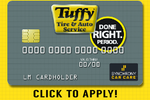Many Chicago drivers want to accessorize their vehicle - you know, make it theirs. One of the easiest ways to get a custom look is to get some new wheels. There are thousands of wheel designs at Chicago area tire shops to get you the look you want. And for many Chicago drivers, that look includes bigger wheels. It used to be that cars came from the factory with 15 or 16 inch wheels. Now 16, 17 and even 18 inchers are standard. And the factories are offering optional wheel packages up to 20 inches or more.
So let's talk about what to consider when you want to upsize your wheels. It's not exactly a DIY project, so you need to know a thing or two before you get started. The most important term to know is rolling diameter. The rolling diameter is simply the overall height of your tire. Unless you want to modify your vehicle suspension, you'll want to keep your rolling diameter the same when you upsize your wheels.
Let's think about those three golden doughnuts in front of you. They're all about the same size. So if we pretend they're tires, they would have the same rolling diameter. The doughnut hole is the size of the wheel. Now pretend we've made the hole bigger on some. That's like having a bigger wheel - but the rolling diameter is the same.
It's important to keep the rolling diameter the same for several reasons. First of all, if the tire is bigger, it might not fit in the vehicle wheel well. Next the speedometer, odometer and anti-lock brake system are all calibrated for the factory rolling diameter. In order for your anti-lock brakes to work properly, the rolling diameter must stay within 3% of the factory recommendation. If you ignore that, you run the risk that your anti-lock brakes won't work properly.
Some have vehicles with electronically-controlled suspension that will be negatively affected by changing the rolling diameter. Let's think about the doughnuts again. You see, as the size of the wheel gets bigger, the sidewall gets shorter. The tire holds less air, so the sidewalls are made stiffer to compensate.
Low profile tires from top manufacturers use special compounds that give the sidewall the strength it needs without compromising ride quality. As you increase your wheel size, you'll typically get a slightly wider tire. This means that you have a larger contact patch. The contact patch is part of the tire that contacts the road. Because there's more rubber on the road, the vehicle will handle better. And braking distances will be shorter. A lot of Chicago folks with trucks or SUVs love the extra control.
Illinois drivers need to watch out that the contact patch isn't so big that the tires rub in turns or over bumps. What we're talking about here is fitment. Your tire professional at Tuffy Chicago (Diversey Pkwy) can help you get this right. He'll install your new wheels, add spacers if needed to make sure your brakes fit inside your new wheels and get you rolling.
Also, if you drive off-road in Illinois a lot, you may need a higher profile tire to protect your new rims. And make sure your new tires have the load rating you need if you tow a trailer or haul heavy loads. Again, your tire professional at Tuffy Chicago (Diversey Pkwy) knows how to help.
And don't forget about tire pressure. If you have larger rims, your new tires will hold less air and they'll need to run a slightly higher pressure. Forget that and you'll wear your tires out fast. Finally, get an alignment at Tuffy Chicago (Diversey Pkwy) after you get your new shoes.
Stop by Tuffy Chicago (Diversey Pkwy) to learn more about how you might upsize your wheels or tires.
You'll find us at:
Tuffy Chicago (Diversey Pkwy)
1400 West Diversey Pkwy
Chicago, Illinois 60614
773-929-3622
 Win a FREE STANDARD OIL CHANGE
Learn more
Win a FREE STANDARD OIL CHANGE
Learn more
 Sign up texting for $5 OFF Any Oil Change
Learn more
Sign up texting for $5 OFF Any Oil Change
Learn more
 Sign up and start Saving.
Learn more
Sign up and start Saving.
Learn more
 Win a FREE STANDARD OIL CHANGE
Learn more
Win a FREE STANDARD OIL CHANGE
Learn more
 Sign up texting for $5 OFF Any Oil Change
Learn more
Sign up texting for $5 OFF Any Oil Change
Learn more
 Sign up and start Saving.
Learn more
Sign up and start Saving.
Learn more









